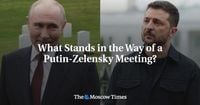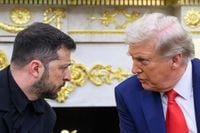As diplomatic efforts to end the war in Ukraine intensify, the prospect of a face-to-face summit between Ukrainian President Volodymyr Zelensky and Russian President Vladimir Putin has become the subject of intense international speculation and behind-the-scenes maneuvering. Yet, as of August 21, 2025, these ambitious plans are showing signs of stalling, with both sides digging in on preconditions and the world’s capitals vying—or recoiling—at the idea of hosting such a historic meeting.
The renewed push for a summit gained momentum after former U.S. President Donald Trump expressed confidence on August 18, 2025, that a meeting between the two leaders could occur within weeks. Trump claimed to have “begun arrangements” for the summit following a phone call with Putin. According to BBC, Trump believed the Russian leader had agreed to participate. However, the Kremlin’s account of the conversation was notably more ambiguous, with aide Yuri Ushakov suggesting only that the possibility of “raising the level of representatives” had been discussed—potentially meaning ministers, not presidents, might soon take part in talks.
German Chancellor Friedrich Merz added fuel to the fire, telling reporters on August 20 that a summit could happen “within the next two weeks.” He cautioned, however, that “we don't know whether the Russian president will have the courage to attend such a summit,” and emphasized the need for Putin to be “persuaded.” Trump, for his part, hinted at consequences for Russia if Putin failed to cooperate in the peace process, though he declined to elaborate on what those might be.
Despite the flurry of diplomatic activity, the likelihood of a Putin-Zelensky meeting appears to be receding. According to The Independent, Russian Foreign Minister Sergei Lavrov stated on August 21 that Putin was ready to meet Zelensky only if all “issues” requiring high-level consideration were worked out in advance. This vague but uncompromising language has been used by Moscow before to resist Ukrainian proposals for direct talks. Lavrov doubled down, declaring that any other security framework for Ukraine would be “an absolutely futile undertaking.”
The sticking point remains security guarantees for Ukraine. Last week, Trump envoy Steve Witkoff said Russia had accepted such guarantees, describing it as “a very significant step.” However, as BBC reports, these guarantees appear to echo Moscow’s 2022 proposal—which Kyiv rejected—granting Russia veto power over military intervention in Ukraine and banning Western troops from being stationed there. For Ukraine, this is a non-starter. Zelensky insisted on August 21 that any meeting with Putin would require prior agreement on security guarantees that include Western support and explicitly exclude Russia from any veto power.
“There is still no signal from Moscow that they are truly going to engage in meaningful negotiations and end this war,” Zelensky posted on social media, calling for increased international pressure on Russia to move the peace process forward.
As the impasse over preconditions drags on, attention has shifted to the possible venue for a summit. The list of potential locations reads like a who’s who of diplomatic hotspots: Budapest, Geneva, Vienna, Istanbul, the Vatican, and Saudi Arabia have all been floated as options. Each, however, comes with its own set of complications and political baggage.
Hungary’s Foreign Minister Peter Szijjarto was quick to offer Budapest, telling BBC, “They can come to Hungary at any time. Give us an hour’s notice beforehand, and we are ready to guarantee fair, decent, safe, and equal conditions for everyone in Hungary.” But the Hungarian capital’s suitability is hotly contested. Prime Minister Viktor Orban has maintained ties with Putin, blocked funding for Ukraine, and pledged to veto Ukrainian membership in the EU. “Let’s be honest, Budapest did not support us,” Zelensky said on August 21, adding that holding talks in Budapest would be “challenging.”
Polish Prime Minister Donald Tusk was even more blunt, posting on X that he opposed Budapest as a venue, referencing the 1994 summit there that led to Kyiv surrendering its Soviet-era nuclear arsenal in exchange for Russian security assurances—assurances later rendered moot by Moscow’s actions in Crimea and the Donbas. “Maybe I’m superstitious, but this time I would try to find another place,” Tusk quipped.
France’s Emmanuel Macron has suggested Switzerland, citing its status as a militarily neutral country with a long history of hosting high-stakes negotiations. Vienna, home to many international organizations, is also on the table. Both Switzerland and Austria, despite being signatories to the International Criminal Court—which issued a warrant for Putin in 2023—have indicated they would grant him immunity for the sake of peace talks.
Turkey, too, is a contender, having already hosted three rounds of Ukraine-Russia delegation-level talks since April. While these discussions have yet to yield a ceasefire, they did result in agreements on prisoner exchanges. The Vatican and Saudi Arabia have also been mentioned by Ukrainian officials as possible venues, with the Vatican’s long-standing offer to mediate and Saudi Arabia’s previous role in brokering prisoner exchanges.
Meanwhile, the war on the ground continues unabated. On August 21, Ukraine claimed its armed forces struck an oil refinery in Russia’s Rostov region, which borders Ukraine’s embattled Donbas. In retaliation, Russia launched its largest wave of strikes on Ukraine in weeks, killing one person and injuring at least 18 others. According to The Independent, Russian missiles struck a U.S. electronics manufacturer in the western Ukrainian town of Mukachevo, injuring 15 people and destroying storage facilities. Ukraine’s Foreign Minister Andrii Sybiha condemned the attack, emphasizing, “A fully civilian facility that has nothing to do with defense or the military. This is not the first Russian attack on American businesses in Ukraine, after strikes on Boeing offices in Kyiv earlier this year and other attacks.”
Amid these ongoing hostilities, the diplomatic deadlock has left both sides accusing each other of undermining peace efforts. Trump has continued his vocal criticism of his predecessor, Joe Biden, for not allowing Ukraine to “FIGHT BACK, only DEFEND.” On Truth Social, Trump wrote, “It is very hard, if not impossible, to win a war without attacking an invader’s country. It’s like a great team in sports that has a fantastic defense, but is not allowed to play offense. There is no chance of winning!” He added, “Regardless, this is a war that would have NEVER happened if I were President—ZERO CHANCE.”
As the international community weighs military options and potential venues, the reality is that neither Ukraine nor Russia appears ready to compromise. Both sides’ entrenched positions—and the mounting toll of violence—make the prospect of a breakthrough seem as distant as ever. For now, the world watches and waits, hoping that the next round of diplomatic maneuvers will bring the two leaders to the table and, at last, closer to peace.



